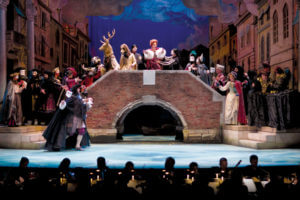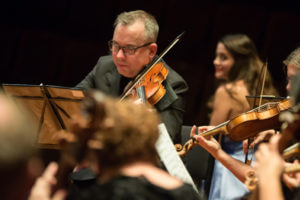About Us
The Boston Early Music Festival (BEMF) is universally recognized as a leader in the field of early music. Since its founding in 1980 by leading practitioners of historical performance in the United States and abroad, BEMF has promoted early music through a variety of diverse programs and activities, including an annual concert series that brings early music’s brightest stars to the Boston and New York concert stages, and the biennial weeklong Festival and Exhibition, recognized as “the world’s leading festival of early music” (The Times, London). Through its programs BEMF has earned its place as North America’s premier presenting organization for music of the Medieval, Renaissance, and Baroque periods and has secured Boston’s reputation as “America’s early music capital” (The Boston Globe).
International Baroque Opera

One of BEMF’s main goals is to unearth and present lesser-known Baroque operas performed by the world’s leading musicians armed with the latest information on period singing, orchestral performance, scenic design, costuming, dance, and staging. BEMF operas reproduce the Baroque’s stunning palette of sound by bringing together today’s leading operatic superstars and a wealth of instrumental talent from across the globe to one stage for historic presentations, all zestfully led from the pit by the BEMF Artistic Directors Paul O’Dette and Stephen Stubbs, and creatively reimagined for the stage by BEMF Opera Director Gilbert Blin.
The twentieth biennial Boston Early Music Festival in June 2019 featured Agostino Steffani’s mesmerizing 1691 opera Orlando generoso, which saw the return of the Boston Early Music Festival Dance Company, a troupe of dancers under the guidance of BEMF Dance Director Melinda Sullivan. The 21st Festival, in June 2021, will be all-virtual with archival video of two of BEMF’s past opera productions, and the 22nd Festival, in June 2023, will feature Henry Desmarest’s 1694 opera Circé from a libretto by Louise-Geneviève Gillot de Saintonge.
BEMF introduced its Chamber Opera Series during its annual concert season in November 2008, with a performance of John Blow’s Venus and Adonis and Marc-Antoine Charpentier’s Actéon. The series focuses on the wealth of chamber operas composed during the Baroque period, while providing an increasing number of local opera aficionados the opportunity to attend one of BEMF’s superb offerings. Subsequent annual productions include George Frideric Handel’s Acis and Galatea, Henry Purcell’s Dido and Aeneas, combined performances of Charpentier’s La Descente d’Orphée aux Enfers and La Couronne de Fleurs, Monteverdi’s Orfeo, a double bill of Pergolesi’s La serva padrona and Livietta e Tracollo, a production titled “Versailles” featuring Les Plaisirs de Versailles by Charpentier, Les Fontaines de Versailles by Michel-Richard de Lalande, and divertissements from Atys by Lully, and most recently Francesca Caccini’s Alcina, the first opera written by a woman. Acis and Galatea was revived and presented on a four-city North American Tour in early 2011, which included a performance at the American Handel Festival in Seattle, and in 2014, BEMF’s second North American Tour featured the Charpentier double bill from 2011.
BEMF has a well-established and highly successful project to record some of its groundbreaking work in the field of Baroque opera. The first three recordings in this series were all nominated for the Grammy Award for Best Opera Recording, in 2005, 2007, and 2008: the 2003 Festival centerpiece Ariadne, by Johann Georg Conradi; Jean-Baptiste Lully’s Thésée; and the 2007 Festival opera, Lully’s Psyché, which was hailed by BBC Music Magazine as “superbly realized…magnificent.” In addition, the BEMF recordings of Lully’s Thésée and Psyché received Gramophone Award Nominations in the Baroque Vocal category in 2008 and 2009, respectively. BEMF’s next three recordings on the German CPO label were drawn from its Chamber Opera Series: Charpentier’s Actéon, Blow’s Venus and Adonis, and a release of Charpentier’s La Descente d’Orphée aux Enfers and La Couronne de Fleurs, which won the 2015 Grammy Award for Best Opera Recording and the 2015 Echo Klassik Opera Recording of the Year (17th/18th Century Opera). Agostino Steffani’s Niobe, Regina di Tebe, featuring Philippe Jaroussky and Karina Gauvin, which was released in January 2015 on the Erato/Warner Classics label in conjunction with a seven-city, four-country European concert tour of the opera, has been nominated for a Grammy Award, was named Gramophone’s Recording of the Month for March 2015, is the 2015 Echo Klassik World Premiere Recording of the Year, and has received a 2015 Diapason d’Or de l’Année and a 2015 Preis der Deutschen Schallplattenkritik. Handel’s Acis and Galatea was released in November 2015. In 2017, while maintaining the focus on Baroque opera, BEMF expanded the recording project to include other select Baroque vocal works: a new Steffani disc, Duets of Love and Passion, was released in September 2017 in conjunction with a six-city North American tour, and a recording of Johann Sebastiani’s St. Matthew Passion was released in March 2018. Four Baroque opera releases followed in 2019 and 2020: a disc of Charpentier’s chamber operas Les Plaisirs de Versailles and Les Arts Florissants was released at the June 2019 Festival, and has been nominated for a Grammy Award; the 2013 Festival opera, Handel’s Almira, was released in late 2019, and received a Diapason d’Or. Lalande’s chamber opera Les Fontaines de Versailles was featured on a September 2020 release of the composer’s works; Christoph Graupner’s opera Antiochus und Stratonica, is being released in December 2020.
Celebrated Concerts

Some of the most thrilling musical moments at the biennial Festival occur during one of the dozen or more concerts presented around the clock, which always include the acclaimed Boston Early Music Festival Orchestra led by Orchestra Director Robert Mealy, and which often feature unique, once-in-a-lifetime collaborations and programs by the spectacular array of talent assembled for the Festival week’s events. In 1989, BEMF established an annual concert series bringing early music’s leading soloists and ensembles to the Boston concert stage to meet the growing demand for regular world-class performances of early music’s beloved classics and newly discovered works. BEMF then expanded its concert series in 2006, when it extended its performances to New York City’s Gilder Lehrman Hall at the Morgan Library & Museum, providing “a shot in the arm for New York’s relatively modest early-music scene” (The New York Times).
World-famous Exhibition

The nerve center of the biennial Festival, the Exhibition is the largest event of its kind in the United States, showcasing nearly one hundred early instrument makers, music publishers, service organizations, schools and universities, and associated colleagues. In 2013, Mozart’s own violin and viola were displayed at the Exhibition, in their first-ever visit to the United States. Every other June, hundreds of professional musicians, students, and enthusiasts come from around the world to purchase instruments, restock their libraries, learn about recent musicological developments, and renew old friendships. For four days, they visit the Exhibition booths to browse, discover, and purchase, and attend the dozens of symposia, masterclasses, and demonstration recitals, all of which encourage a deeper appreciation of early music, and strengthen relationships between musicians, participants, and audiences.

